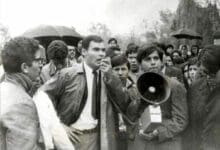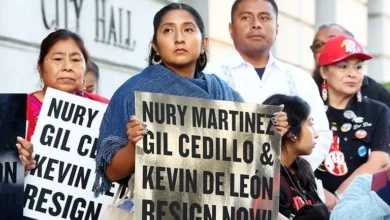Our Man In Honduras
“If you want to understand who the real power behind the [Honduran] coup is” says Robert White, president of the Washington-based Center for International Policy, during a recent interview, “you need to find out who’s paying Lanny Davis.”
Davis, an ally of the Clinton family who is best known as the lawyer who defended Bill during the presidential impeachment proceedings, was recently on Capitol Hill lobbying members of Congress and testifying against exiled President Manuel Zelaya before the House Foreign Relations Committee. White, who previously served as the United States ambassador to El Salvador, thought that such information about Davis’ clients would be “very difficult to find.”
But the answer proved easy to find. Davis, a partner at the law firm Orrick, Herring, & Sutcliffe, openly named them — and his clients are the same powerful Hondurans behind the military coup. “My clients represent the CEAL, the [Honduras Chapter of] Business Council of Latin America” said Davis when reached at his office last Thursday. “I do not represent the government and do not talk to President [Roberto] Micheletti. My main contacts are Camilo Atala and Jorge Canahuati. I’m proud to represent businessmen who are committed to the rule of law,” said Davis. Atala, Canahuati, and other families that own the corporate interests represented by Davis and the CEAL are at the top of an economic pyramid in which 62 percent of the population lives in poverty, according to the World Bank.
Camilo AtalaFor many Hondurans and Honduras watchers, the confirmation that Davis is working with powerful, old Honduran families like the Atalas and Canahuatis is telling: To them, it proves that Davis serves the powerful business interests that ran, repressed and ruined Honduras during the decades prior to the leftward turn of the Zelaya presidency.
“No coup just happens because some politicians and military men decide one day to simply take over” says White upon hearing who Davis is working for “Coups happen because very wealthy people want them and help to make them happen, people who are used to seeing the country as a money machine and suddenly see social legislation on behalf of the poor as a threat to their interests. The average wage of a worker in free trade zones is 77 cents per hour.”
“The tragedy” adds White, “is that the Canahuatis and the Atalas and the other big businesspeople don’t understand that it’s in their best interest to help to do things like help people make a decent living, reduce unemployment and raise the minimum wage.”
Davis disagrees. He believes that the tragedy of Honduras lies with Zelaya and that the president brought the coup upon himself. “It is an undisputed fact that Mr. Zelaya has violated the Constitution. It’s my job to get the facts out.”
Asked if he had qualms about representing business people linked to a coup government denounced and unrecognized by the United Nations, the Organization of American States and many countries across the globe (including the United States), Davis responded, “There are facts about Mr. Zelaya that the world community may not be aware of. I’m proud to represent clients who support the decision of Secretary of State Clinton to back the mediation of President Arias in the conflict [between Zelaya and coup leaders]. But my biggest concern is safety and security of the Honduran people.”
Davis is not the only one concerned about the safety and security the Honduran people. The Committee of Families of Disappeared-Detainees in Honduras (COFADEH), a non-governmental human rights organization, released a report last week documenting over 1,100 human rights violations – arbitrary detentions, physical assaults, murders, and attacks on the media by the government and affiliated clandestine forces — that have occurred since the coup began on June 28.
COFADEH has also placed responsibility for the coup and the terror it has wrought directly on many of the founders of the Alliance for Progress and Development of Honduras (APROH), a predecessor of CEAL. Though now defunct, APROH brought together some of the same business and military interests that compose the political and economic hub of Honduran’s radical right, including the Canahuatis, Atalas and other CEAL families and businesses represented by Davis.
The CEAL predecessor’s track record on human rights has been less than stellar. In 1983, Honduras’ El Tiempo newspaper leaked an internal APROH document that recommended a military solution to problems in Honduras — and the rest of Central America — to Ronald Reagan’s Kissinger Commission, a bipartisan committee charged with formulating U.S. policy in the region. Perhaps more damning, APROH is considered by COFADEH and other human rights organizations as the eminence grise behind the death squad killings conducted by the infamous “Batallion 316″ in the 1980s.
Jorge CanahuatiUpon hearing Davis’ statements, Jose Luis Galdamez, a journalist for Radio Globo, laughs. “Mr. Davis is either ignorant of Honduras or is knowingly bloodying his name and that of the Clintons for lots of money,” he says. Galdamez recently went into hiding after members of the armed forces and paramilitary organizations harassed him and his colleagues. The military raided his radio station, beat workers there and threatened them for working at one of the few independent media outlets willing to “report about what’s actually happening in Honduras,” says Galdamez.
“I wish Mr. Davis would come here where I’m hiding so I can show him what it’s like to feel threatened not just by [de facto Honduran President] Micheletti and the military, but by the Canahautis and other groups of power he represents,” says Galdamez.
Galdamez, Gilda Rivera of the Center for Women’s Rights, and others interviewed for this story fear that, in hiring Clinton ally Davis, Canahuati, Atala and CEAL are using the liberal sheen of the Democratic party to divert attention from the dark history behind the current Honduran coup.
“The rich simply send you out to kill you and then kill with impunity. They never investigate into who killed who because the groups in power control the media, control the judiciary and now control the government again,” says Galdamez. “Mr. Davis is trying to legitimize people who use psychological intimidation and violence. He’s representing the interests of state terror.”
In a recent statement denouncing the coup, COFADEH described its backers as “the same group that in the 1980s was known as Alliance for Progress and Development of Honduras, which maintains its terror thru death squads.” The COFADEH report documents four cases of extra-judicial killings, including the July 5 shooting of 19 year-old Isis Obed Murillo, captured in a graphic video subsequently posted on YouTube.
Asked about human rights violations by the Micheletti government, Davis again places the onus for the current crisis on Zelaya. “I researched the facts on what occurred during the presidency of Mr. Zelaya. Mr. Zelaya led mob violence and you can see that on a YouTube video.”
When pressed about the grisly footage of the shooting of 19 year-old Isis Murillo, Davis responded, “Is there a video of the shooters? We need to know the facts.” He added, “If you can show me facts proving that my clients are involved in violations of civil liberties, I’ll resign.”
(This article appeared originally in the American Prospect, www.prospect.org)











